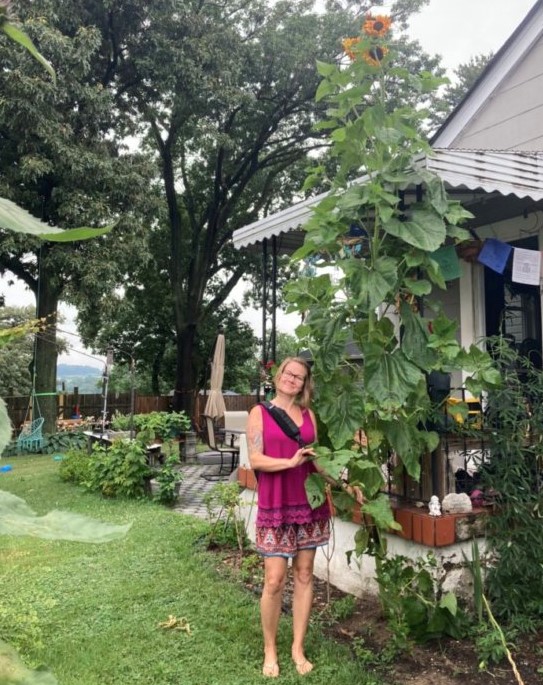Sustainability Champions Series: Casey Jackson
August 16, 2022 Elizabeth Main
The School of Nursing employee practices sustainability in the office, at home, and everywhere in between.
The University of Maryland, Baltimore (UMB) Office of Sustainability would like to recognize Casey Jackson, research quality manager for the Office of Research and Scholarship at the University of Maryland School of Nursing (UMSON), as a Sustainability Champion! Jackson runs the UMSON Research Quality Assurance Program and serves as a co-departmental reviewer on all UMSON research protocols to vet projects for ethical, quality, and feasibility concerns, among other duties.
As an eight-year employee of UMB, Jackson has always been an enthusiastic proponent of sustainable lifestyle and office practices. While employed at the University of Maryland Greenebaum Comprehensive Cancer Center (GCCC), she worked outside of her role to bring together recycling leadership between the University of Maryland Medical Center (UMMC) and UMB to improve GCCC department understanding around recycling, increase buy-in, offer support, and promote educational recycling in-services as part of department meetings. Jackson championed the initiative to install recycling containers around the eighth and ninth floors of the hospital; prior to this initiative, there were no opportunities for recycling in these areas. During her employment at GCCC, she commuted using the UMB shuttle or biked to work from her city home.
As a UMB student, she became involved in student sustainability efforts through various meetings and networking as a bridge between her staff and student roles on campus. She served on the UMB Sustainability Committee prior to inception of the UMB Office of Sustainability, served as the Staff Senate liaison to the Sustainability Committee, and currently serves on the UMSON Green Committee (GreenSON).
Jackson lives the mission by using reusables while in the office. Her ceramic coffee cup, salad bowl, silverware, and UMB-provided refillable water bottle from her orientation are used every day while in the office. She mainly takes the stairs, uses the Baltimore CityLink bus or carpools for transportation to and from work, supports/utilizes telework to the greatest extent possible, turns off lights when not in use, does not have a desk-side trashcan, has donated reusable K-cup pods to her office for general use, and has an office full of living plants. She is currently working to implement a major change for UMSON researchers — the transition from paper-based to electronic research files to reduce researcher dependency on paper resources. This change involves several regulatory and operational considerations and has not been easy but with her persistence, it will go live in 2023!
In her personal life, Jackson also lives in alignment with sustainable food values, including enjoying a plant-based lifestyle, growing an abundance of vegetables in her home garden (and sharing with the office!), and weekly meal planning and food prepping to reduce food waste.
When asked about one thing that fellow students, staff, and faculty at UMB can do to contribute to campus sustainability efforts, Jackson admits that it is hard to narrow it down to only one thing. “If I had to pick one: I think that the campus would benefit most by banning single-use plastics so that everyone could learn just how easy it is to bring your own. It may seem like a big change and yes, change is hard at first, but then you get in a groove and it is easy peasy!” Swapping out single-use plastics is a small change that can have a huge impact, especially since items like plastic cutlery and straws are not accepted for recycling in most of the world (including our area). To illustrate the point, Jackson has come up with a hypothetical scenario:
“Imagine it is a Monday and no one on campus brought their own cutlery, so they used a plastic fork. According to 2019 data, UMB has about 7,200 students and 7,600 staff and faculty, so that could equate to about 14,800 plastic forks used that day. If we guesstimate that 3 plastic forks occupies a 4 cubic inch space, then the forks used would take up about 19,733 cubic inches — or 85 gallons (the size of a large fish tank aquarium) — for a single day at UMB. It may seem small, but when done every day for about 261 workdays per year, the annual amount of just plastic fork waste would be the size of about 2 large tanker trailers. Is this the legacy UMB wants to leave to the community and greater world?”
Do you have a UMB Sustainability Champion you would like to nominate to be featured? Please fill out this form. Self-nominations are welcome.
Subscribe here to the UMB Sustainability newsletter and follow the UMB Sustainability social media channels (Facebook, Twitter, and Instagram).